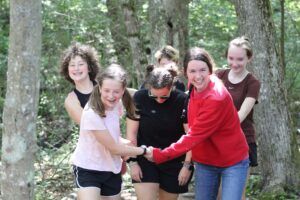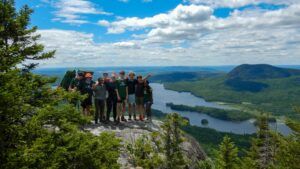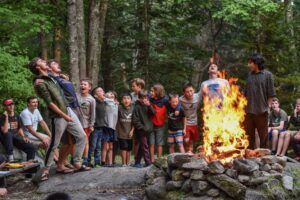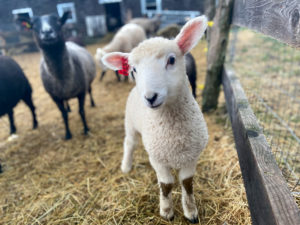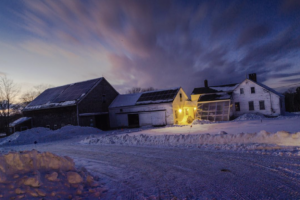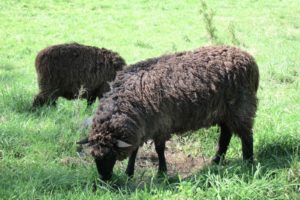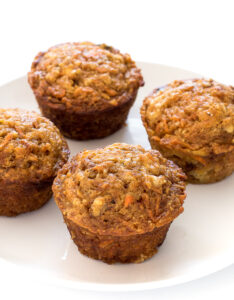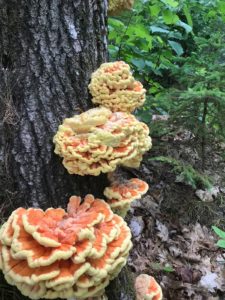Oftentimes at Chewonki, we speak to the connection between the head, heart, and hands. Here are a few excerpts from stories shared with family and friends of Semester 55 students during Family Weekend just before Thanksgiving:
That head-heart-hand connection has been seen so many times on the farm this semester, through heavy harvests and chicken coop cleaning, during afternoons of mulching garden beds, planting garlic, or working with our draft horse Sal. One particularly memorable afternoon early in the semester, a strong core of volunteers came down to the farm to pick up loose-cut hay from the hayfield. Using pitchforks, they tossed the hay from the piled windrows into the back of the truck and trailer in record time. This is a traditional way of haying: farmers came together to draw straws each summer and then rotated from farm to farm bringing in each hay crop. That afternoon was the epitome of the phrase, “Many hands make light work.” Perhaps the least traditional part of it was Malcolm’s choice to pause in his hay collecting to spell out his name in giant letters made of hay. This, too, is typical of this group: oftentimes the work of their hands is hemmed in by a certain playfulness.
This group of students has invested in our farm above and beyond what is required of them. They stay after work programs to help with afternoon chores and, earlier in the fall, to lead visiting middle schoolers through those chores. They volunteer to close in the chicken coops at night or to give the cows an extra flake of hay before bedtime. Six young women spent one Sunday afternoon learning to ground drive our draft horse. Early in the semester, students and faculty rallied around bean shelling, coming down to the farm during advising meetings and free times to shell a miniature mountain of beans. Jonah spent one early morning setting up fencing after chores. And Clyde too lingered late one afternoon to set up fencing for the livestock, noting that his grandfather taught him the value of staying until a task is complete. One weekend afternoon, a small crew rallied to help a staff member with his personal turkey slaughter. It feels important to note that these are all examples of work that needed to be done, but that this work was not assigned or sometimes even explicitly asked of these students: they have done more than what is required and so much of what must be done.


This group of students has been especially notable in the breadth and depth of their love for pigs. Since getting piglets on the farm last month, there has been a stream of students in and out of their pen: Ava, Malcolm, Clyde, Kate, Parker, Ellie, Jonah, Carolyn, Emily W., Avery, Sophie, Sarah, Ruthie, Celia . . . the list could go on. We always prepare students to be especially gentle and to keep their distance from the piglets, who are usually particularly skittish and need time to become comfortable around people. This was no issue this semester. Most likely because of the constant parade of visitors and fans, the piglets were happy to be scratched and trying to eat students’ shoelaces within hours of their arrival.
Furthering the head-heart connection, students have engaged in real and ready conversations as their hands have been moving. That same work program, Abby and Sam kept up a good working pace and a good conversation while packing the carrots into the root cellar. We sang and played games and told stories while processing onions, and then a huge group of students stayed late to get the last of the 2000-plus pounds weighed and loaded onto the back of the truck. A small handful of students – Peter, Parker, and Jonah– have traveled to our local slaughterhouses to drop off our livestock with farmers, engaging in critical conversation and easy talk throughout the process.
This is a group that has consistently said “yes,” volunteering for all sorts of tasks and tending to all of the details. They have celebrated the full circles of our systems – often at meals, you’ll hear a student remark, “I milked that milk.”
 Many thanks, Semester 55, for the work of your hands and the contributions of your heads and hearts. We farmers are grateful.
Many thanks, Semester 55, for the work of your hands and the contributions of your heads and hearts. We farmers are grateful.


